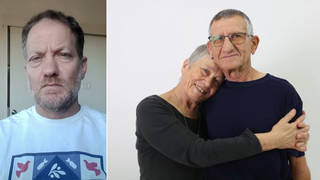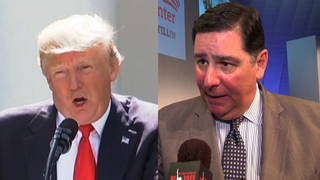
Guests
- David Bankscurrent White House special assistant for international energy and environment.
This year’s U.N. climate summit in Bonn, Germany, marks the first climate conference since President Donald Trump vowed to pull the United States out of the landmark 2015 Paris climate agreement, a process that takes four years. We speak with Trump’s climate adviser David Banks, the White House special assistant for international energy and environment, about his views on climate change and the Trump administration’s stance on the role by humans in inducing climate change. This comes one day after the Trump administration made its official debut at COP23 with a forum pushing coal, gas and nuclear power that included speakers from coal company Peabody Energy, a nuclear engineering firm and a gas exporter.
Transcript
AMY GOODMAN: This is Democracy Now!, democracynow.org, The War and Peace Report. We’re broadcasting live from the U.N. climate summit in Bonn, Germany. This is the first climate summit since President Trump vowed to pull the U.S. out of the landmark 2015 Paris climate agreement, a process that takes four years.
On Monday, there was a revolt here at the U.N. climate summit as the Trump administration made its official debut at a forum pushing coal, gas and nuclear power. The panel was the only official appearance by the U.S. delegation during this year’s U.N. climate summit and included speakers from coal company Peabody Energy, a nuclear engineering firm and a gas exporter. It also included representatives of Vice President Mike Pence’s office and Trump’s climate adviser, David Banks, the White House special assistant for international energy and environment.
On the panel, Banks said he was very accessible to the press, although, well, he has repeatedly refused requests to come on Democracy Now! Yesterday on Democracy Now! during our interview with former Greenpeace head Kumi Naidoo, David Banks lingered just off set, waving to us, but declined to come on the show. However, just after the broadcast, we raced over to David Banks, where a scrum of reporters were questioning him.
AMY GOODMAN: David Banks, do you believe human beings have anything to do with climate change, anything to do with the warming of the planet?
DAVID BANKS: So, from an administration perspective, I think the president would say the climate is always changing.
AMY GOODMAN: Do you believe that human beings are involved with climate change?
DAVID BANKS: Do I? Why are you so interested in what I—
AMY GOODMAN: You’re the representative of the Trump administration here. You’re the first person we’ve been able to speak to here about the Trump administration position.
DAVID BANKS: No, I think—look, I think that—I think the administration would agree that humans contribute to climate change. Right? I think—I think the question—and by the way, this is not—
AMY GOODMAN: So, do you disagree with the president that climate change is a Chinese hoax?
DAVID BANKS: Look, I mean, I work for the president of the United States, and I support the president’s decisions. Right? I supported the president’s decision when it came to withdrawing from the Paris Agreement. Right? You know, the president—
AMY GOODMAN: So, do you believe it’s a Chinese hoax?
DAVID BANKS: Do I believe it’s a Chinese hoax?
AMY GOODMAN: Climate change. I’m just quoting the president of the United States, who you work for.
DAVID BANKS: No, but I think you’re missing the point of the tweet. I mean, look—
AMY GOODMAN: Explain it.
DAVID BANKS: Well, no, the point of the tweet was—again, we talked a little bit about this last night. You know, the president views climate change through the lens of, you know—or climate change policy through the lens of, you know, what does this do to U.S. manufacturing, what does it do to U.S. competitiveness, right? And so, you know—and given his—given his focus on trade—right?—and the trade imbalance, particularly how U.S. manufacturing has been devastated, you know, since—particularly since China entered the WTO, you know, I think—
AMY GOODMAN: Well, what about the fact that climate change, sadly, has been a bonanza for China, because it is now excelling in Chinese renewables, that we now buy back in the United States, and the president is holding U.S. manufacturers back from this? Kathleen—
DAVID BANKS: Well, I don’t think—no, he’s not holding manufacturers back.
AMY GOODMAN: Kathleen Hartnett White, the environmental policy adviser—Kathleen Hartnett White, the environmental policy adviser, said that solar power is “parasitic,” to quote her.
DAVID BANKS: You know, I love—I love these quotes that you’re pulling out. No, I mean, look, look, the president—the president is not holding back renewables, right? One of the key objectives of the president and this administration is to make sure that we truly do pursue an all-of-the-above approach—right?—to make sure that all energy sources and forms have as much of a level playing field as possible, right? We believe in competitive markets for energy. I think—but your point on China, though, is an interesting point. So when you’re looking at our solar manufacturing sector, again—I mean, I was—I was really surprised by how devastating trade has been for our solar manufacturing. Right? And the—and look, China is not a market economy. If China says, “Hey, you know, here’s a sector of the economy that we want to go after”—
AMY GOODMAN: What about if the U.S. government gave subsidies to wind and [solar] power and other renewable technologies in the same way it gives subsidies to the oil industry, to the fossil fuel industry?
DAVID BANKS: I think, look—look, people love to make the comparison. I’m happy to talk about subsidies, but that’s kind of an apples-to-oranges conversation, right? Because oil—if you just look at oil, oil—I think maybe we use—maybe oil accounts for maybe 1 percentage point of U.S. power generation, maybe. Maybe. And I think that’s probably right. But no, I mean, look—
AMY GOODMAN: And you’re pushing for a higher percentage for coal right now. That’s what the panel was doing.
DAVID BANKS: No, no, no, we’re not—no, no, no, no. I think, no, we’re not pushing for a higher percentage. I think if my domestic policy colleagues were here, they would say we just—you know, we want to make sure that we—that coal has a level playing field and that it doesn’t—that it’s not facing, you know, burdensome regulations that prevent it from being competitive.
AMY GOODMAN: Can you tell me why there weren’t representatives of solar and wind on the panel yesterday, just nuclear, gas and coal? Why—this is the U.S.—one of the people who was in the audience said, “What is this? QVC shopping network?” You’re selling coal, gas—
DAVID BANKS: QVC—we’re not selling coal or gas—
AMY GOODMAN: Coal, gas and nuclear power. Where was—
DAVID BANKS: —or nuclear power.
AMY GOODMAN: Where was solar and wind?
DAVID BANKS: What was the conversation about?
AMY GOODMAN: For level playing field, where was solar and wind, as well?
DAVID BANKS: We didn’t need to include renewables on the panel, because renewables are everywhere in the COP, right? We want to make sure that we have a rational discussion on technology innovation—right?—for fossil, and make sure that nuclear has a good plug for, as well—right?—because of the role it plays in climate mitigation, not only in the United States, but across the world.
AMY GOODMAN: David Banks, you said that you wouldn’t—that you don’t disagree with the president, when he is a proud climate change denier. How is it that you can go against the consensus of more than 95 percent of the world’s scientists? Are you a scientist yourself, with different kind of data than the rest of the world has?
DAVID BANKS: I am not a scientist, but, you know, I’m an economist, and so, therefore, I understand—
AMY GOODMAN: So these are scientists, talking about climate change.
DAVID BANKS: —the global economy and the—yes.
AMY GOODMAN: So, are you saying it’s not that you disagree that humans are involved with climate change, you just disagree with the solutions for the problem of the world’s seas rising? You actually believe human beings are involved with climate change, but you disagree with how to deal with that?
DAVID BANKS: I think the administration would say that humans contribute to climate change, right? I think the real disagreement is the policy that’s often presented.
AMY GOODMAN: That’s not what President Trump said. They say that climate change is a hoax.
DAVID BANKS: Well, I think—no, I think—I think the president would say that—I think the president would strongly disagree with the policies that were put together by the previous administration, that would have severely harmed the American economy.
AMY GOODMAN: That’s David Banks, the White House special assistant for international energy and environment. He’s Trump’s climate adviser. When we come back, we’ll get response from the renowned climate scientist Kevin Anderson. Stay with us.












Media Options